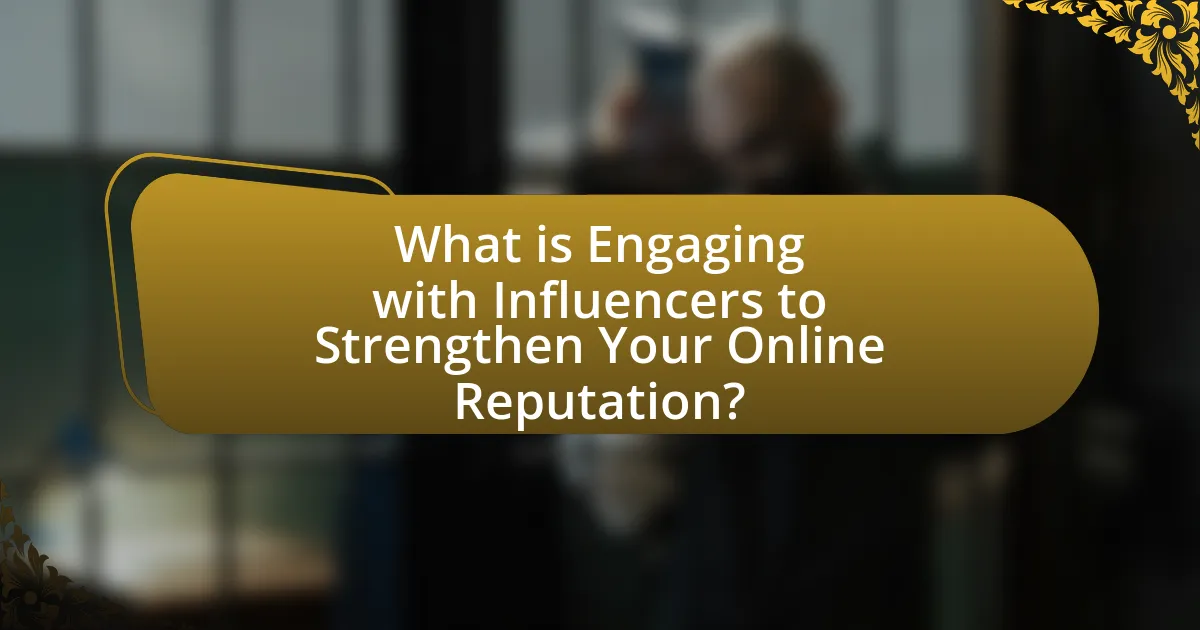Engaging with influencers to strengthen online reputation involves collaborating with credible individuals in a brand’s industry to enhance visibility and trust. This strategy capitalizes on the established relationships influencers have with their audiences, as 49% of consumers rely on their recommendations for purchasing decisions. Key elements of successful influencer engagement include authenticity, effective communication, collaboration, and performance measurement. The article also addresses the importance of online reputation for businesses, the impact of influencer credibility on brand perception, and strategies for identifying and building relationships with the right influencers. Additionally, it highlights potential challenges and risks associated with influencer partnerships, along with best practices for maintaining authenticity and measuring campaign effectiveness.

What is Engaging with Influencers to Strengthen Your Online Reputation?
Engaging with influencers to strengthen your online reputation involves collaborating with individuals who have a significant following and credibility in your industry to promote your brand positively. This strategy leverages the influencer’s established trust with their audience, allowing your brand to gain visibility and credibility through authentic endorsements. Research indicates that 49% of consumers depend on influencer recommendations when making purchasing decisions, highlighting the effectiveness of this approach in enhancing brand perception and trustworthiness.
How does influencer engagement impact online reputation?
Influencer engagement significantly enhances online reputation by leveraging the trust and credibility that influencers have with their audiences. When brands collaborate with influencers, they gain access to a wider audience and can improve their perceived authenticity, as 49% of consumers depend on influencer recommendations for their purchasing decisions. This trust translates into positive brand associations, which can lead to increased customer loyalty and higher conversion rates. Additionally, a study by the Digital Marketing Institute found that 70% of teenagers trust influencers more than traditional celebrities, highlighting the effectiveness of influencer engagement in shaping public perception and enhancing online reputation.
What are the key elements of influencer engagement?
The key elements of influencer engagement include authenticity, communication, collaboration, and measurement. Authenticity ensures that influencers genuinely align with the brand’s values, fostering trust among their audience. Effective communication involves clear and open dialogue between brands and influencers, facilitating a mutual understanding of goals and expectations. Collaboration refers to the co-creation of content that resonates with both the influencer’s audience and the brand’s message, enhancing engagement. Finally, measurement involves tracking the performance of influencer campaigns through metrics such as reach, engagement rates, and conversions, allowing brands to assess the effectiveness of their influencer partnerships. These elements collectively contribute to a successful influencer engagement strategy that strengthens online reputation.
How does influencer credibility affect brand perception?
Influencer credibility significantly enhances brand perception by fostering trust and authenticity among consumers. When influencers are perceived as credible, their endorsements are more likely to resonate with their audience, leading to increased brand loyalty and positive associations. Research indicates that 61% of consumers trust influencer recommendations, which is higher than traditional advertising methods. This trust translates into a favorable brand image, as consumers often view credible influencers as relatable and knowledgeable, thereby influencing their purchasing decisions.
Why is online reputation important for businesses?
Online reputation is crucial for businesses because it directly influences consumer trust and purchasing decisions. A positive online reputation can lead to increased customer loyalty, higher sales, and improved brand perception. According to a survey by BrightLocal, 87% of consumers read online reviews for local businesses, and 79% trust online reviews as much as personal recommendations. This demonstrates that a strong online reputation can significantly impact a business’s success by attracting new customers and retaining existing ones.
What role does online reputation play in consumer decision-making?
Online reputation significantly influences consumer decision-making by shaping perceptions of trust and credibility. Consumers often rely on online reviews, ratings, and social media presence to assess the quality of products or services before making a purchase. Research indicates that 84% of consumers trust online reviews as much as personal recommendations, highlighting the importance of a positive online reputation in driving purchasing decisions. Furthermore, a study by BrightLocal found that 91% of consumers read online reviews regularly, demonstrating that a strong online reputation can lead to increased customer engagement and sales.
How can a strong online reputation benefit a business?
A strong online reputation can significantly benefit a business by enhancing customer trust and loyalty. When a business maintains a positive online presence, it attracts more customers, as 84% of consumers trust online reviews as much as personal recommendations. This trust leads to increased sales and customer retention, as satisfied customers are more likely to return and recommend the business to others. Additionally, a strong reputation can improve search engine rankings, making it easier for potential customers to find the business online. According to a study by Moz, online reviews account for 15% of how Google ranks local businesses, indicating that a solid reputation directly influences visibility and accessibility.

What strategies can be used to engage with influencers?
To engage with influencers effectively, brands should utilize personalized outreach, collaborative content creation, and mutual value exchange. Personalized outreach involves researching influencers to tailor communication, demonstrating genuine interest in their work, which increases the likelihood of a positive response. Collaborative content creation, such as co-hosting webinars or creating joint social media campaigns, fosters a sense of partnership and enhances visibility for both parties. Mutual value exchange ensures that influencers receive benefits, such as exclusive access to products or financial compensation, making them more inclined to promote the brand. These strategies are supported by studies indicating that personalized approaches yield higher engagement rates, with a 6.2% increase in response rates when outreach is customized.
How do you identify the right influencers for your brand?
To identify the right influencers for your brand, analyze their audience demographics, engagement rates, and content relevance. Brands should assess whether the influencer’s followers align with their target market, as this ensures effective communication and potential conversion. For instance, a study by Influencer Marketing Hub found that 63% of marketers believe that audience engagement is more important than follower count, highlighting the significance of genuine connections. Additionally, tools like BuzzSumo and HypeAuditor can provide insights into an influencer’s performance metrics, further validating their suitability for brand partnerships.
What criteria should be considered when selecting influencers?
When selecting influencers, key criteria include audience alignment, engagement rates, authenticity, and niche relevance. Audience alignment ensures that the influencer’s followers match the target demographic of the brand, which is crucial for effective communication and marketing. Engagement rates, measured through likes, comments, and shares, indicate how actively the influencer interacts with their audience, reflecting their influence and reach. Authenticity is vital, as influencers who genuinely connect with their audience foster trust, leading to higher conversion rates. Niche relevance ensures that the influencer’s content aligns with the brand’s industry, enhancing credibility and effectiveness in messaging. These criteria collectively contribute to a successful influencer partnership that can strengthen a brand’s online reputation.
How can audience alignment enhance influencer partnerships?
Audience alignment enhances influencer partnerships by ensuring that the influencer’s followers match the brand’s target demographic. This alignment increases the likelihood of engagement, as the content resonates more with the audience’s interests and needs. For instance, a study by Nielsen found that 92% of consumers trust recommendations from individuals over brands, highlighting the importance of authentic connections. When influencers promote products to an audience that is already interested in similar offerings, conversion rates improve, leading to more effective marketing outcomes.
What methods can be employed to build relationships with influencers?
To build relationships with influencers, brands can employ methods such as personalized outreach, collaboration on content, and consistent engagement on social media platforms. Personalized outreach involves crafting tailored messages that resonate with the influencer’s interests and values, which increases the likelihood of a positive response. Collaboration on content, such as co-hosting webinars or creating joint blog posts, fosters a sense of partnership and mutual benefit. Consistent engagement, including commenting on their posts and sharing their content, helps maintain visibility and demonstrates genuine interest in their work. These methods are effective as they create authentic connections, leading to long-term relationships that can enhance a brand’s online reputation.
How can personalized outreach improve influencer engagement?
Personalized outreach can significantly improve influencer engagement by fostering a genuine connection between brands and influencers. When brands tailor their communication to reflect the unique interests and values of each influencer, it increases the likelihood of a positive response. Research indicates that personalized messages can lead to a 29% higher response rate compared to generic outreach, as influencers feel more valued and understood. This approach not only enhances the chances of collaboration but also builds long-term relationships, ultimately strengthening the brand’s online reputation through authentic endorsements.
What role does content collaboration play in influencer relationships?
Content collaboration is essential in influencer relationships as it fosters mutual engagement and enhances authenticity. When brands and influencers co-create content, they leverage each other’s strengths, resulting in more relatable and engaging material that resonates with audiences. This collaborative approach not only amplifies reach but also builds trust, as audiences perceive the partnership as genuine. Research indicates that 92% of consumers trust recommendations from individuals over brands, highlighting the importance of authentic content in influencer marketing. Therefore, effective content collaboration strengthens the bond between brands and influencers, ultimately enhancing their online reputation.

What are the potential challenges in engaging with influencers?
Engaging with influencers presents several potential challenges, including misalignment of brand values, authenticity issues, and varying audience engagement levels. Misalignment occurs when an influencer’s values or messaging do not resonate with the brand’s identity, potentially leading to negative perceptions among consumers. Authenticity issues arise when audiences perceive influencer promotions as insincere or overly commercialized, which can diminish trust and engagement. Additionally, varying audience engagement levels can complicate partnerships, as some influencers may have large followings but low interaction rates, resulting in ineffective campaigns. These challenges necessitate careful selection and management of influencer relationships to ensure alignment and effectiveness.
What risks should brands be aware of when partnering with influencers?
Brands should be aware of several risks when partnering with influencers, including reputational damage, lack of authenticity, and regulatory compliance issues. Reputational damage can occur if an influencer engages in controversial behavior or makes offensive statements, which can reflect poorly on the brand. A lack of authenticity may arise if the influencer’s audience perceives the partnership as insincere, leading to decreased trust and engagement. Additionally, brands must navigate regulatory compliance, as failure to disclose paid partnerships can result in legal repercussions, as highlighted by the Federal Trade Commission’s guidelines on endorsements and testimonials.
How can negative influencer behavior impact a brand’s reputation?
Negative influencer behavior can significantly damage a brand’s reputation by eroding consumer trust and leading to negative public perception. When influencers engage in controversial or unethical actions, their associated brands often face backlash, as consumers may associate the negative behavior with the brand itself. For instance, a study by the Digital Marketing Institute found that 70% of consumers are less likely to purchase from a brand that partners with an influencer involved in a scandal. This illustrates how negative influencer actions can directly affect brand loyalty and sales, highlighting the importance of careful influencer selection and monitoring.
What strategies can mitigate risks associated with influencer partnerships?
To mitigate risks associated with influencer partnerships, brands should implement thorough vetting processes, establish clear contracts, and maintain ongoing communication. Thorough vetting involves assessing an influencer’s audience demographics, engagement rates, and past collaborations to ensure alignment with brand values. Establishing clear contracts outlines expectations, deliverables, and legal protections, reducing the likelihood of misunderstandings or negative outcomes. Ongoing communication fosters transparency and allows for quick resolution of any issues that may arise during the partnership. These strategies collectively minimize potential reputational damage and ensure a more successful collaboration.
How can brands measure the effectiveness of influencer engagement?
Brands can measure the effectiveness of influencer engagement through key performance indicators (KPIs) such as engagement rate, reach, and conversion metrics. Engagement rate, calculated by the total interactions (likes, comments, shares) divided by total followers, indicates how well the audience resonates with the content. Reach measures the total number of unique users who see the influencer’s content, providing insight into brand visibility. Conversion metrics, such as click-through rates and sales generated from influencer campaigns, directly link influencer efforts to business outcomes. According to a study by Influencer Marketing Hub, 63% of marketers believe that measuring ROI from influencer marketing is crucial, highlighting the importance of these metrics in evaluating effectiveness.
What metrics are essential for evaluating influencer campaigns?
The essential metrics for evaluating influencer campaigns include engagement rate, reach, impressions, conversion rate, and return on investment (ROI). Engagement rate measures the level of interaction (likes, comments, shares) relative to the audience size, indicating how well the content resonates with followers. Reach quantifies the total number of unique users who see the content, while impressions count the total views, providing insight into visibility. Conversion rate tracks the percentage of users who take a desired action, such as making a purchase or signing up for a newsletter, demonstrating the campaign’s effectiveness in driving actions. Finally, ROI assesses the financial return generated from the campaign relative to its cost, allowing brands to evaluate overall profitability. These metrics collectively provide a comprehensive view of an influencer campaign’s performance and impact on brand reputation.
How can feedback from influencer collaborations inform future strategies?
Feedback from influencer collaborations can inform future strategies by providing insights into audience preferences and engagement metrics. Analyzing the performance of influencer campaigns reveals which content resonates most with target demographics, allowing brands to tailor their messaging and approach accordingly. For instance, a study by the Influencer Marketing Hub found that 63% of marketers believe that influencer feedback significantly enhances their marketing strategies. This data underscores the importance of leveraging influencer insights to refine future campaigns, ensuring they align with consumer interests and maximize impact.
What best practices should be followed for successful influencer engagement?
Successful influencer engagement requires establishing authentic relationships, aligning brand values with influencer content, and maintaining clear communication. Authentic relationships foster trust, which is essential for effective collaboration; studies show that 92% of consumers trust recommendations from individuals over brands. Aligning brand values ensures that the influencer’s audience resonates with the message, enhancing engagement rates. Clear communication facilitates mutual understanding of goals and expectations, leading to more effective campaigns. These practices collectively contribute to a stronger online reputation and increased brand visibility.
How can authenticity be maintained in influencer partnerships?
Authenticity in influencer partnerships can be maintained by ensuring that influencers genuinely align with the brand’s values and messaging. This alignment fosters trust and credibility, as consumers are more likely to engage with content that feels sincere. Research indicates that 86% of consumers consider authenticity important when deciding which brands to support, highlighting the necessity for brands to select influencers whose personal brand resonates with their own. Additionally, allowing influencers creative freedom to express their unique voice while promoting the brand can enhance authenticity, as it encourages genuine content creation that reflects the influencer’s true opinions and experiences.
What are the key takeaways for brands looking to enhance their online reputation through influencers?
Brands looking to enhance their online reputation through influencers should prioritize authenticity, strategic partnerships, and audience alignment. Authenticity is crucial; consumers are more likely to trust and engage with brands that collaborate with influencers who genuinely resonate with their values and products. Strategic partnerships involve selecting influencers whose content and audience demographics align with the brand’s target market, ensuring that the message reaches the right people. Additionally, brands should monitor engagement metrics and feedback to assess the effectiveness of influencer collaborations, as studies show that 49% of consumers depend on influencer recommendations for their purchasing decisions. By focusing on these key areas, brands can effectively strengthen their online reputation.

Leave a Reply